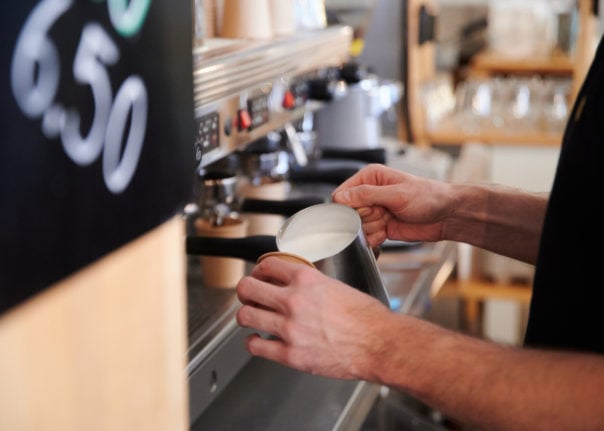English speakers are no stranger to using certain German words when speaking English—schadenfreude and kindergarten being perhaps the most obvious. The process is possibly even more advanced in reverse.
Many Germans are proud of being able to speak English well, and the Berlin Wall’s fall in 1989 only accelerated the process, as a redefined international community – with English as the main global language – beckoned.
Now English words are found in all parts of German life. Many Germans don’t even necessarily understand why. English-language cultural influence is certainly a part of German life, but the dubbing of television shows, to use just one example, remains far more widespread in Germany than in many smaller European countries, which use original audio with subtitles.
Here’s a selection of anglicisms that Germans use with each other.
READ ALSO: Could Denglisch one day kill of English?
‘Coffee-To-Go’ or ‘Takeaway’
‘Ein Kaffee zum mitnehmen’ is correct and your coffee shop owner will definitely understand what you want if you ask for it. But plenty of Germans will ask for a ‘Coffee-To-Go,’ even when speaking German to a German barista. This seems to only apply to coffee ordered on the move, however. If you’re sitting down at a table, expect to order the German Kaffee.

Human Resources, ‘Soft Skills’ and ‘Manager’
‘Personalabteilung’ is still used to describe a human resources department. But plenty of German companies—whether international or mostly German will use Human Resources even in German-language communication. Although ‘Leiter’ and ‘Leiterin,’ meaning ‘leader’ are used, even German job titles will use “Manager.” The word ‘Manager’ has even been adapted to accommodate German noun genders. A female manager, may be referred to as a ‘Managerin’.
READ ALSO: How easy is it to get an English-speaking job in Germany?
The world of work in Germany is also notable for importing another contemporary English term. ‘Soft Skills’ is used in German when recruiters are looking to see if a candidate might fit culturally into a particular workplace. The words actually describing these skills, like ‘Führungskompetenz’ or ‘leadership ability,’ often sound unmistakably German though. But there are exceptions. ‘Multitasking’ is used in German as well.
‘Clicken,’ ‘Uploaden,’ ‘Downloaden’ and ‘Home Office’
As technology that came of age relatively recently, German has imported many English terms related to technology and the Internet. While web browsers might use ‘Herunterladen’ instead of ‘download’ or ‘hochladen’ instead of ‘upload,’ Germans are just as likely to use the slightly Germanized version of the English word, hence ‘downloaden’.
READ ALSO: Seven English words Germans get delightfully wrong
Even before ‘Home Office’ appeared on German tax returns, to calculate what credit workers could get from remote work during the Covid-19 pandemic, ‘Home Office’ was still widely used in German to describe, well, working from home. It can be confusing for English speakers, though, especially those from the UK, because the Home Office is a department in the British government.
English words that have slightly different meanings in German – ‘Shitstorm’ and ‘Public Viewing’
There are English words Germans use that don’t always mean quite the same thing to a native English speaker. An English speaker from the UK or Ireland, for example, might associate a ‘public viewing’ with an open casket funeral. Germans, however, tends to use “public viewing” almost exclusively to mean a large screening, usually of an event, that many people can gather to watch for free. Placing a large television at the Brandenburg Gate for German Football Team matches is perhaps the most immediately recognisable example of a ‘public viewing’.
Then there’s what, at least to native English speakers, might sound outright bizarre. But former Chancellor Angela Merkel herself used “Shitstorm” more than once while in office. In German though, it can refer specifically to a social media backlash involving heated online comments.
Another typical English-sounding word used in German differently is ‘Handy’ – meaning cellphone (well, it does fit in your hand). It can sound a bit strange to English speakers, though.
Other words, however, more or less mean what you think they do – such as when one German newspaper referred to Brexit as a ‘Clusterfuck’.
READ ALSO: Shitstorm ‘best English gift to German language’




 Please whitelist us to continue reading.
Please whitelist us to continue reading.
Member comments